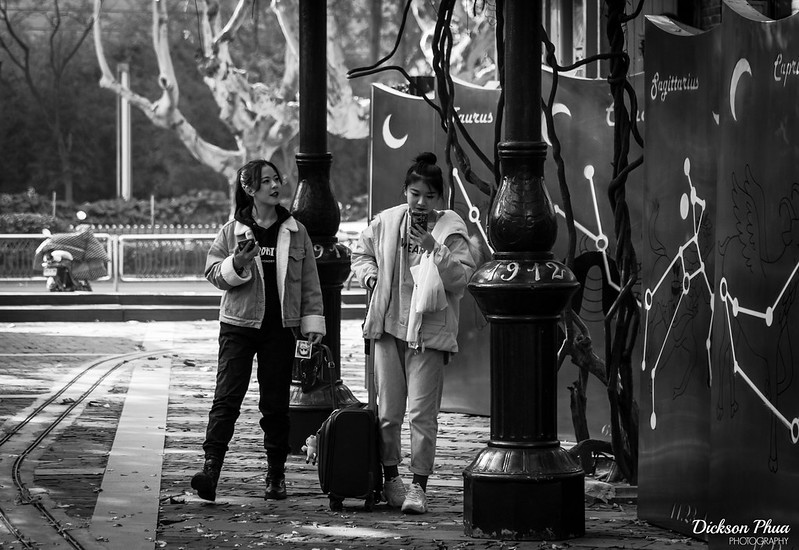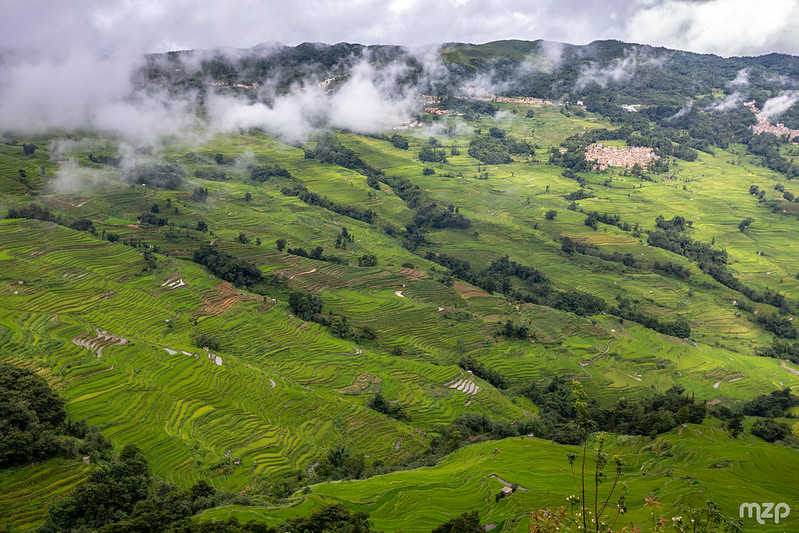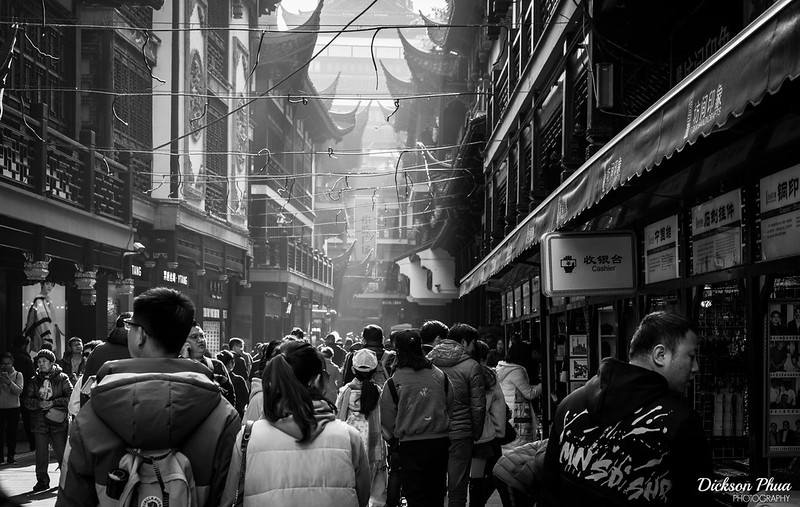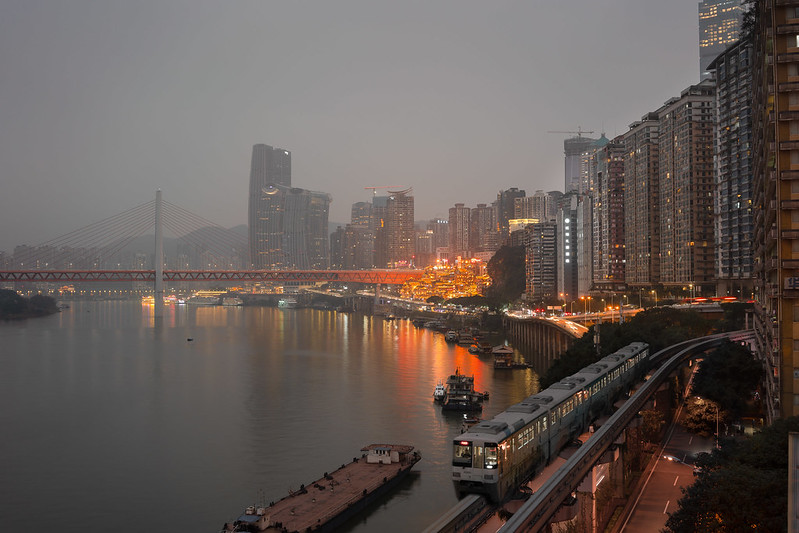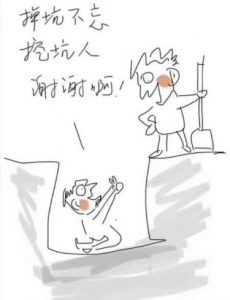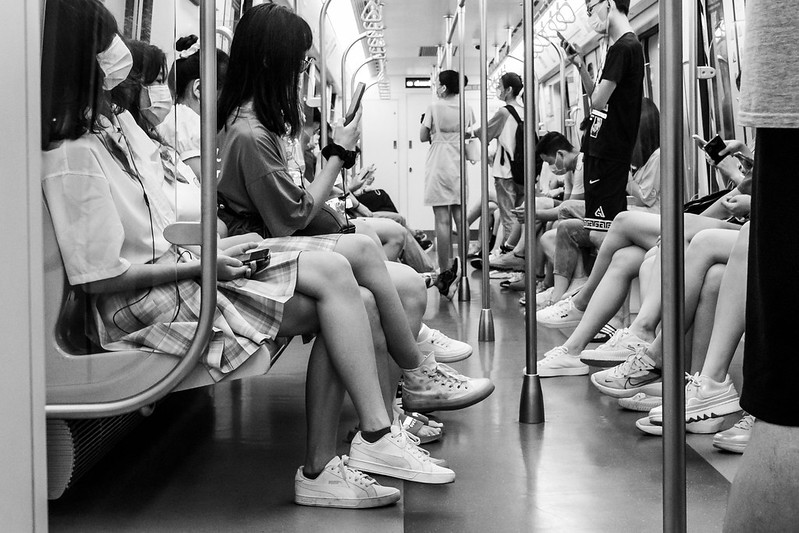The New York Times’ Chris Buckley reports on a new campaign against corruption and disloyalty in China’s public security machinery:
Officials in China’s law-and-order apparatus have been ordered to “drive the blade in” and “scrape poison off the bone,” setting aside personal loyalties to expose wayward colleagues. The model for this “education and rectification” program, leaders have told them, should be Mao Zedong’s drive of the 1940s, which cemented his dominance over the party from a base in the city of Yan’an.
[…] Such mobilization sessions have proliferated across China — in courts, police headquarters, prison administrations and the secretive Ministry of State Security, which controls the country’s main civilian surveillance and spy forces.
[…] “The Yan’an rectification was about obeying Mao in everything, and that’s the biggest signal from learning from Yan’an this time,” Deng Yuwen, a former Chinese editor for a Communist Party newspaper, said in an interview from the United States, where he now lives. “The core goal of cleaning up the political and legal system is also to obey Xi in everything.”
[…] The campaign is scheduled to last until early 2022, the cusp of a Communist Party congress that will install a new cohort of central officials and, most likely, extend Mr. Xi’s time in power. Publicity about the campaign has described local officials studying Mr. Xi’s writings and speeches in indoctrination classes deep into the night. [Source]
There has been pervasive promotion of Xi’s signature ideology since its enshrinement in the Party and national constitutions, driven through channels such as research funding, mandatory study apps, and higher education. Recent examples include the Ministry of Foreign Affairs’ establishment last month of a "Center for Research of Xi Jinping Thought on Diplomacy", and an official guidance document on boosting China’s science fiction cinema and visual effects industry through measures prominently including "study and implement[ation of] Xi Jinping Thought."
The Wall Street Journal’s Chun Han Wong also reported on the ongoing campaign:
Within the first week after the call to action, Communist Party enforcers had launched investigations into at least 21 police and judicial officials, according to a media tally cited by the party’s top law-enforcement commission. Dozens more have since been taken down, including the police chief of Shanghai, the most senior target thus far, and cadres who have won awards for good performance.
The rash of investigations marks the first time that Mr. Xi has unleashed a sweeping and systematic clean-up of the country’s powerful domestic-security apparatus. His push to forge police, prosecutors and judges who are “absolutely loyal, absolutely pure and absolutely reliable”—as officials running the campaign have demanded—points to thorny concerns that Mr. Xi faces at home even as he seeks to slow a downward spiral in relations with the U.S.
[…] Firmer control over China’s security forces also gives Mr. Xi more leverage as he positions himself to secure a third term as Communist Party leader in 2022, said Wu Qiang, a Chinese politics researcher and former lecturer at Beijing’s Tsinghua University.
“Xi is especially reliant on this coercive state apparatus, yet also distrustful of it,” Mr. Wu said. [Source]
The University of Vienna’s Ling Li commented on the crackdown at The China Story:
I cannot remember ever having heard of a rectification campaign that was preceded by a pilot program. Usually pilot programs are used for organizational reshuffles, e.g. the setup of the Supervision Commissions or the “quota judge” (员额制) reforms in courts and procuratorates. Rather noteworthy is that the important inaugural conference for the new rectification campaign was not chaired by Guo Shengkun, head of Central Political-Legal Committee, but by its Secretary 秘书长 Chen Yixin (known as Xi’s man from Zhejiang). Guo did not even seem to be present at the conference. [Chris Buckley’s NYT report also highlighted Chen’s apparently rising star as a trusted enforcer.]
Fourth, according to Chen Yixin’s speech at the inaugural conference, the upcoming rectification campaign will follow a similar format to the one developed between 2013 and 2017, i.e. a combination of ideological indoctrination, mandatory self-reporting, and solicitation of reporting from others on wrong-deeds, which include both crimes and political violations. Mandatory self-reporting was an effective investigative tool at the time, which deprived the targets of their previous privileges against self-incrimination and led to punishing inaccurate reporting when offenses are detected through other leads. It will be deployed in this campaign too.
[…] In Chen Yixin’s speech at the inaugural conference, he made clear that the current political-legal rectification campaign would emulate the Yan’an rectification campaign (1942 to 1945). The latter is known in Party history for its indispensable role in the formulation of Mao Zedong Thoughts, which was subsequently elevated to become the guiding ideology of the Party. Recall that only a few months into the Yan’an rectification campaign, the office of the Party Chairman was created, which Mao was the first and last person to hold till his death. Does the leader of the current rectification campaign strive to achieve the same? [Source]
Also at The China Story, Adam Ni recalled a famous discussion at Yan’an, on the historical cycle of dynastic rise and fall, in his observations on Xi’s focus on constant self-policing as key to the regime’s survival:
In January 2018, Xi addressed the topic of dynastic cycle and political power at some length in a speech on party-building. After discussing select historical episodes, he concluded that the common denominator that led to the fall of past Chinese regimes is internal erosion, especially from corruption and division. For Xi, the primary means of keeping the Party from succumbing to the vicious cycle of the birth and decay of political power is “self revolution” (自我革命), that is, renewing the life-blood of the Party through self-imposed, and sometimes painful, changes that strengthen its organisational and ideological cohesion.
[… Xi] has repeatedly argued that constant vigilance and adaptation is the only way to keep the Party from being swept away into history’s dustbin. In a warning to party cadres, Xi said in July 2019:
Our party is the world’s largest party. There is no external force that can defeat us; only we can defeat ourselves.
The imperatives of regime security have prompted the CCP under Xi to declare, in the strongest language, the supremacy of the Party as the most fundamental and indisputable feature of China’s political system, an inevitability born out of history. Xi’s emphasis on the need for party supremacy across the full spectrum of political, economic and social activities highlights a heightened level of vigilance and insecurity. [Source]
Ni and Yun Jiang discussed the new rectification campaign further in their China Neican newsletter on Sunday. They described invocations of the Yan’an precedent as “quite chilling,” adding that “Xi is not Mao; today’s China is far moved from the China during the high Maoism. But these bloodstained lessons of yore must inform our thinking on the trajectory of the People’s Republic as it travels down the road of Xi’s vaunted ‘new era’.”
Last September, China Media Project’s David Bandurski discussed the related theme of douzheng (斗争), or "struggle," after Xi used it 56 times in an address to the Central Party School. Though the speech was an extreme example, Bandurski wrote, "this recent litany of ‘struggles’ is not some Xi era outlier […]. In fact, Xi Jinping’s entire tenure thus far has been attended by a rather dramatic comeback of the notion of ‘struggle’":
Xi’s constant “struggling” in the September 3 speech means we should entertain more seriously the possibility that Xi is facing his own real struggles within the Party as he grapples with this substantial list of challenges. His choice of language might be intended to send a tough message to those within the Party who resist his leadership, or attempt to work against his objectives. So this talk of “struggle” could point to fierce internal struggles and squabbles within the Chinese Communist Party. Certainly, if we look back on the past half century, we can see that talk of “struggle” at the official level has often served as a warning to those who might act at cross purposes to those in power, or who might mount criticism or opposition.
[…] By the 19th National Congress in November 2017, “great struggle” had already become solidified into a new numerical propaganda phrase pushed by Xi Jinping. The so-called “Four Greats” (四个伟大) were about carrying out a 1) “great struggle” (伟大斗争) in order to build 2) “great projects” (伟大工程), promote 3) “great achievements” (伟大事业) and realize the 4) “great dream” (伟大梦想) — the last a reference to Xi’s so-called “Chinese dream” of the “great rejuvenation of the Chinese people.”
But the “Four Greats,” led by the notion of “struggle,” were also deeply enmeshed with the governance of the Party itself, the idea being that a “great rejuvenation” could only be achieved if the Party could remain united around the firm core of General Secretary Xi. As Wang Qishan, the powerful and feared outgoing anti-corruption chief (and soon to be vice-chairman) wrote in an article in the People’s Daily on November 7, 2017: “Comprehensive and strict governance of the Party provides a staunch guarantee for historic change. If our Party is to carry out a great struggle, build great projects, promote great achievements and realize the great dream, it must unswervingly adhere to comprehensive and strict governance of the Party.” [Source]
The Central Party School is itself the site of political rectification following the firing of former professor Cai Xia. Cai, now in the United States, called for Xi’s replacement in a strongly worded online speech translated by CDT earlier this year. The official notice of her dismissal also cited her authorship of a critical post on Hong Kong’s then-prospective National Security Law, and her signing of a petition for free speech in honor of whistleblowing doctor Li Wenliang. In interviews published since her firing, Cai has described her criticism of Xi as an act of patriotism, and estimated that 70% of the Party’s members sympathize to some degree, "and among middle- and high-level officials the proportion may be even higher." Foreign Policy’s James Palmer commented in his China Brief newsletter this week that "even if resentment toward Xi’s leadership is growing, nobody in the party has the ability to act. Short of a full-blown coup or a health crisis for Xi, the entire system is locked in to ideological paranoia, yes-man thinking, and an increasing personality cult."
South China Morning Post’s Josephine Ma reported this week on efforts to deter any others at the School from speaking out:
Management of the Communist Party’s top academy has been told to take action to ensure staff – and former staff – remain loyal and to step up scrutiny of employees’ overseas travel, after the party expelled an outspoken retired professor.
He Yiting, executive vice-president of the elite Central Party School, told 60 department heads and senior officials on Monday to carry out “meticulous work” to keep retirees loyal in particular, according to a statement on the school website on Thursday.
[…] He also ordered them to make sure there was no dissent from any teaching staff or management.
“We have to ensure there is absolutely no diversion of opinions that violates the party’s theories and direction, and absolutely no public statements that are different from the decisions of the party leadership,” he said. [Source]
In an interview with CNN on Saturday, Cai commented on the suppression of opposition to Xi from critics including outspoken property tycoon Ren Zhiqiang, whom Cai defended after his expulsion from the Party last month.
[… I]t was from the inside that Cai watched the Communist Party, which is the sole governing party within mainland China, taking a harder stance on internal debates and dissent. Under former President Hu Jintao, Xi’s predecessor, dissent was still tolerated — although the space was already shrinking, Cai said. Since Xi came to power, however, intra-party democracy has become nothing but an empty name, she added.
"What he emphasized was the concentration of power and the absolute conformity and loyalty to the Party’s central leadership," she said. "He does not allow dissenting voices from within the Party, punishing those who air a different opinion with Party discipline and corruption charges."
[…] Speaking to CNN, Cai said Xi’s "reign of terror" did not come from a position of strength — instead, it exposed his deep sense of insecurity. "He’s the one who’s the most scared. That’s why he launched round after round of purges inside the Party," she said. "The person holding supreme power always feels that others are plotting a power grab."
In the current political climate, few dare to speak up publicly, Cai said. "When reporting information to their superiors, officials often conceal the truth and only report what they would like to hear. The information conveyed upwards is false, and there is no more scientific, democratic, open and transparent decision making," she said. "Under such circumstances, major problems will definitely arise in policy making." [Source]
Another prominent critic of Xi is former Tsinghua University law professor Xu Zhangrun, who was fired last month after a brief detention. Xu has sinced declared his intention to challenge the "wholly nonexistent" solicitation of prostitutes used to justify his detention and, in part, his dismissal. Xu was previously suspended from teaching duties at the university after a series of sharp written attacks on Xi’s leadership.
Xu has now received an appointment as Associate in Research at Harvard University’s Fairbank Center for Chinese Studies. As Geremie Barmé notes at China Heritage, this would "in normal circumstances […] afford Xu Zhangrun access to library collections at the university and relevant participation in the intellectual life of the institution," but Xu is currently "becalmed in Beijing, under official surveillance, unemployed and barred from leaving China." Barmé translated Xu’s letter of thanks to Harvard, in which he reiterated his critique of China’s current leaders
You hold the power of life and death over others; your will and whims decided who will flourish and who will come undone. That’s why, by all rights, you have no good reason to be so fearful of the fresh flowers placed on new graves, or the sorrowful tears of widows.
The very skies and earth, why, the air itself — why, you claim dominion over them all! Your power courses through the land with impunity and in your miscreant behaviour you evince no heartfelt trepidation, even when confronted by punishing calamities: be it the surging floodwaters or the plague that has scarred our land. [Note: Here the writer is referring to the calamities of 2020.]
This reflects a truth that has been unchanged from the days when you first came into being: you are contemptuous of everything civilised and decent; you are determined to befoul whatsoever is beautiful in humanity; you cannot tolerate the fact that the people just want a peaceful and happy existence. Even less do you have any real notion of the pleasures and delights of normal existence, for you worship at the altar of crude violence. In your pursuit of your evil calculations you cleave to the ingrained habits of fraudulence and treachery. Why? Simple: because really you are indeed afraid, and you are scared of everything. Why, you are even unsettled by yourselves! That’s because you know all too well that the only thing that can be detected in your empty hearts is the obsidian gloom of the jail house. [Source]
© Samuel Wade for China Digital Times (CDT), get_post_time('Y'). | Permalink | No comment | Add to del.icio.us
Post tags: Cai Xia, Central Party School, communist party, corruption, Harvard, ideology, judicial corruption, judiciary, Justice System, legal system, Mao Zedong, party discipline, police, police corruption, public security, Ren Zhiqiang, Xi anti-corruption campaign, Xi Jinping, Xi Jinping Thought, Xu Zhangrun
Feed enhanced by Better Feed from Ozh
source
https://chinadigitaltimes.net/2020/08/loyalty-to-xi-lies-at-core-of-public-security-purge/
